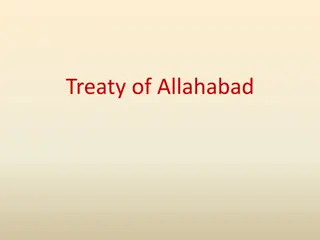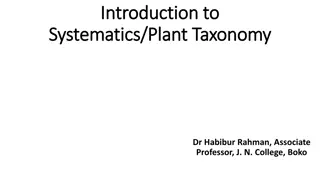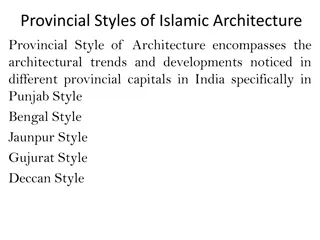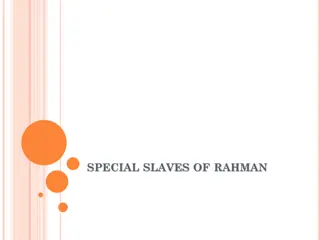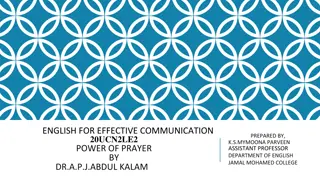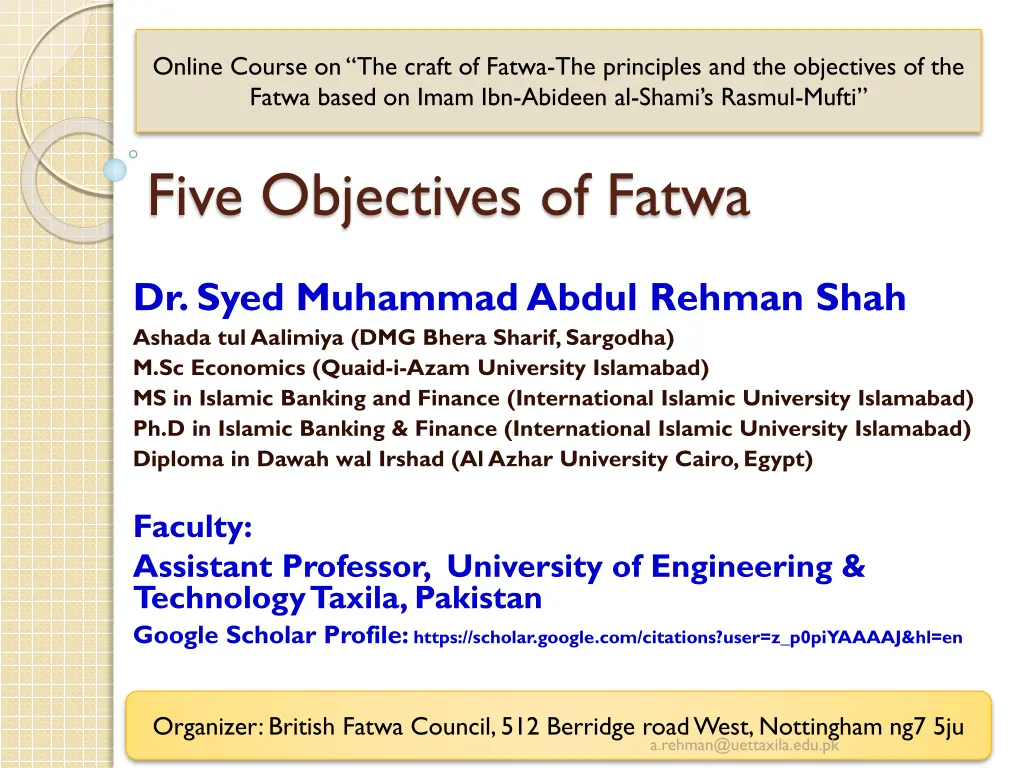
Craft of Fatwa: Principles & Objectives Based on Imam Ibn Abideen al-Shami
Explore the online course on the craft of Fatwa, delving into the principles and objectives based on the renowned scholar Imam Ibn Abideen al-Shami. Discover the significance of Fatwa and its application in classical and modern literature, guided by Dr. Syed Muhammad Abdul Rehman Shah's expertise.
Download Presentation

Please find below an Image/Link to download the presentation.
The content on the website is provided AS IS for your information and personal use only. It may not be sold, licensed, or shared on other websites without obtaining consent from the author. If you encounter any issues during the download, it is possible that the publisher has removed the file from their server.
You are allowed to download the files provided on this website for personal or commercial use, subject to the condition that they are used lawfully. All files are the property of their respective owners.
The content on the website is provided AS IS for your information and personal use only. It may not be sold, licensed, or shared on other websites without obtaining consent from the author.
E N D
Presentation Transcript
Online Course on The craft of Fatwa-The principles and the objectives of the Fatwa based on Imam Ibn-Abideen al-Shami s Rasmul-Mufti Five Objectives of Fatwa Dr. Syed Muhammad Abdul Rehman Shah Ashada tulAalimiya (DMG Bhera Sharif, Sargodha) M.Sc Economics (Quaid-i-Azam University Islamabad) MS in Islamic Banking and Finance (International Islamic University Islamabad) Ph.D in Islamic Banking & Finance (International Islamic University Islamabad) Diploma in Dawah wal Irshad (Al Azhar University Cairo, Egypt) Faculty: Assistant Professor, University of Engineering & Technology Taxila, Pakistan Google Scholar Profile: https://scholar.google.com/citations?user=z_p0piYAAAAJ&hl=en Organizer: British Fatwa Council, 512 Berridge road West, Nottingham ng7 5ju a.rehman@uettaxila.edu.pk
Contents Introduction Mapping of Maxim and Objectives to Rasm ul Mufti Objectives of Shai ah and their Importance in Classical and Modern Literature Maqasid Theory by Imam Ghazali a.rehman@uettaxila.edu.pk
Introduction- Ibn bid n's 74 couplets named on the mufti's task , written in the century. Then, himself and titled it by seventeenth he explained It is a highly condensed version of a conventional academic work sometimes called manuals for muftis or adab al-muft . It aims to inform the professional mufti and the educated jurist of a methodology for the discovery of a rule of law. a.rehman@uettaxila.edu.pk
Introduction- Writer Muhammad Amin Ibn 'Abidin (Arabic: ) Birth 1189 A.H (1784 A.D)---- Death 1252 A.H (1836 A.D) He was a prominent Islamic scholar and Jurist who lived in the city of Damascus in Syria during the Ottoman era. He was the authority of the fiqh (Islamic jurisprudence) of the Hanafi madhhab (school of law). He was a state employee with the title of Amin al-fatwa. This meant that he was the mufti that people would go to when they had legal questions in Damascus. He composed over 50 works consisting of a major fatwa (legal statement) collection, many treatises, poems, and several commentaries on the works of others. His most famous work was the Radd al-Muhtar 'ala al-Durr al- Mukhtar as an authoritative text of Hanafi fiqh today. a.rehman@uettaxila.edu.pk
Introduction-Fatwa For more than a millennium, fatwas have guided and shaped Muslim understandings of Islamic law. Ranging in import from the routine to the revolutionary, and in from one-line answers to short treatises, fatwas have served to reaffirm received wisdom, caution against error, and chart novel responses to changing circumstances. The interpreters, the muftis of Islam, have included the greatest independent scholars of the ages, heads of large state bureaucracies, and unassuming jurists in local districts. a.rehman@uettaxila.edu.pk
Introduction-Fatwa Fatwa is to strive to interpret God's design for the Muslim community. Islamic Legal interpretation uses an approach unique in Islamic jurisprudence, a casebook of expert analyses of fatwas from a wide range of times and places to illustrate particular opinions and their contexts in individual capacity, then as institution (Ibn-e- Khaldun) The historians, lawyers, language specialists, doctors, economists, and social scientists address fatwas as fundamental source from multidiscipline on both Islamic legal thought and Islamic social history. a.rehman@uettaxila.edu.pk
Assigned Topic: The five Objectives of Fatwa (i) To preserve the individual s life (ii) To preserve the individual s religion (iii) To preserve the individual s honor (iv) To preserve the individual s wealth (v) To preserve the individual s mind a.rehman@uettaxila.edu.pk
Mapping of Maxim and Objectives of Shariah to text of Rasm ul Mufti a.rehman@uettaxila.edu.pk
Objectives of Fatwa In 5th couplet, he asks for Allah s s support and success of acceptance in the objectives. Holy Prophet (PBUH) said: The boldest in Fatwa is expected more near to fire (69/1, ) : a.rehman@uettaxila.edu.pk
Objectives of Fatwa On same pattern, again he explains in 7th and 8th couplet. : [ ] 169 : He [Shaitan (Satan)] commands you only what is evil and Fahsha (sinful), and that you should say against Allah what you know not. a.rehman@uettaxila.edu.pk
Objectives of Fatwa Change over the time would be considered by Mufti to secure benefits or repelling evils. a.rehman@uettaxila.edu.pk
Objectives of Fatwa The preference of Istehsan ((Juristic Discretio) to Qiyas (Analogy) provides basis to consider the objectives of Shari ah in drafting fatwa. 45 There are different types of Istehsan which are integrated to the objectives of Shari ah. Like in 64 and 65. a.rehman@uettaxila.edu.pk
Divine Sources and Rationality Rational approach is also considered with divine sources to achieve the higher intents of Shari ah: a.rehman@uettaxila.edu.pk
The Custom and Shariah Ruling General custom would be considered in Shari ah ruling with objective to repel difficulties from masses. a.rehman@uettaxila.edu.pk
Law of Necessity and Facilitation : 83 : 85 Ibn e Abidin documented in Rasm ul Mufti: 308 : 175 : 33 : : : 21 a.rehman@uettaxila.edu.pk
The Objectives of Shaiah and their Importance in Classical and Modern Literature a.rehman@uettaxila.edu.pk
Intents of Shai ah in Classical Literature 2/37 . : Shatibi: Intents of law giver is to provide success in this life and hereafter as well. Further, he said: . . : : : a.rehman@uettaxila.edu.pk
Intents of Shai ah in Classical Literature . : 3/271 . : Aamdi: Intents of law giver is to secure benefits or repelling evils or both of them. a.rehman@uettaxila.edu.pk
Maqasid Theory by Imam Ghazali : Imam Ghazali: There are five basic objectives of Shari ah. These can be said fundamental right of an individual. All of them are explained in next three slides in context of a Shari ah maxim : . 1/287 : a.rehman@uettaxila.edu.pk
Maqasid Theory by Imam Ghazali Items Affirmative Legislation (Hudud) Verses Al Baqrah 256 Protection of Faith Security to Sacred Places Punishment of Conversion Al Baqrah 179 Al Maaeda 32 Protection of Life Healthcare Shelter Food Clothing Security Qasaas o Diyyat a.rehman@uettaxila.edu.pk
Items Affirmative Legislation (Hudud) Punishment of Intoxication: 80 Lashes Verses Al Maaeda 90 Protection of Intellect Education Al Maaeda 38 Protection of Assets and Property Lockers Inflation Control Riba- Free Investment Hayya Based Society Punishment of Hand cutting Hadith E Maaez Married: Rajam Unmarried: 100 Lashes Protection of Progeny/ Bloodline Al Noor 2 a.rehman@uettaxila.edu.pk
(1973.D) : . 183 Maqasid are overall intents considered by lawgiver in all commandments. : a.rehman@uettaxila.edu.pk
(1974. D) : : . : 3 . Ultimate goals and wisdom of Shari ah commands is Maqasid . : : . a.rehman@uettaxila.edu.pk
Comprehensive Definition : . Hashim Kamali (2008) The word Maqsid (plural: Maqasid) reflects a meaning of purpose, objective, principle, intent, goal. It comprise the wisdom and knowledge behind rulings, the objectives of particular actions. (Continue) a.rehman@uettaxila.edu.pk
Comprehensive Definition Hashim Kamali (2008) The Shari ah is predicated on the benefits of the individual and that of the community, and its laws are designed so as to protect these benefits and facilitate improvement and perfection of the conditions of human life on earth. a.rehman@uettaxila.edu.pk
Subject Matter of the Objectives of Shariaah Subject Matter of Maqasid is to secure benefits or repelling evils and to ensure Shari ah rulings. . a.rehman@uettaxila.edu.pk
Significance of Objectives of Shari ah The objectives are the essence of Actions : . 2/344 : . . : 5 . : a.rehman@uettaxila.edu.pk
Significance of Objectives of Shari ah : The Objectives Theory increases satisfaction on belief. Example: . : 14/278 a.rehman@uettaxila.edu.pk
Classification of Maqasid a.rehman@uettaxila.edu.pk
Classification of Maqasid/Masalih Shatibi (d.790 A.H) divided on behalf of Imam ul harmain Jawaini (d.478/1085)general objectives into three categories in a descending order of importance: i) Daruriyyat (Essentials), Faith, Life, Lineage, Intellect and Property a.rehman@uettaxila.edu.pk
Classification of Maqasid/Masalih ii) Hajiyyat (Complementary) It consists of what is needed by the community for the achievement of its interest and the proper functioning of its affairs. If it is neglected, the social order will not actually collapse but will not function well. Likewise, it is not on the level of what is indispensable (daruri) (Ibn Ashur, 2006, p. 123). a.rehman@uettaxila.edu.pk
Classification of Maqasid/Masalih Tahsiniyyat (embellishments) These are in the nature of desirable parts as they seek to attain refinement and perfection in the customs and conduct of people at all levels of achievement (Kamali, 2008). a.rehman@uettaxila.edu.pk
Extension of Classical five objectives Ibn e Taymiyya (D. 728) said to prolong to benefit and to protect from harmful. Sidiqi (2008) discussed Environmental Protection . Chapra (2008)added Good Governess The Nexus of development and Maqasid al-Shari ah (Siddiqi, 2006). Ibn Ashur (2006) has also added efficiency & economic perspective. a.rehman@uettaxila.edu.pk
Egyptian Dar ul Ifta and the Objectives of Shari ah . The objectives of Shari ah are cornerstone to draft a Fatwa. a.rehman@uettaxila.edu.pk

